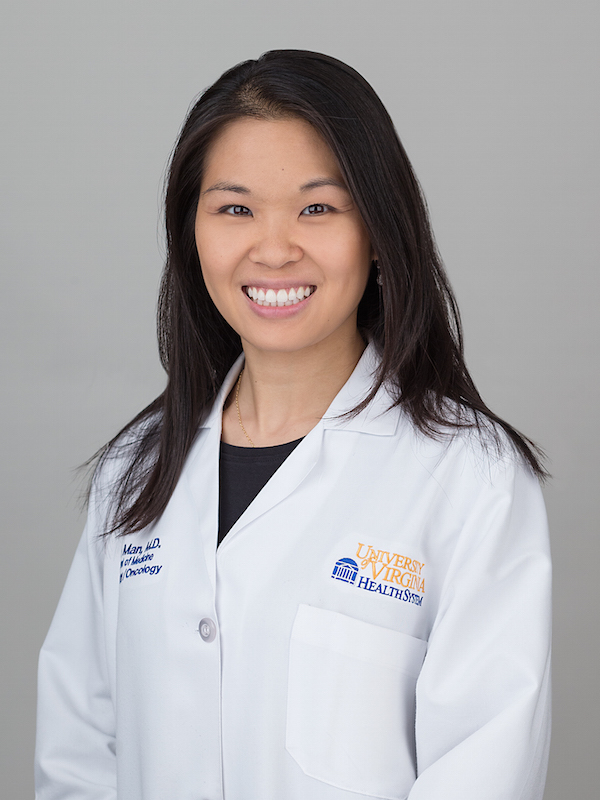
At a Glance
- Title: Assistant Professor of Medicine, Division of Hematology/Oncology
- Fellowship: University of Virginia School of Medicine, Hematology/Oncology
- Residency: Eastern Virginia Medical School, Norfolk, VA, Internal Medicine
- Medical Degree: St. George’s University Medical School, Grenada, West Indies
A good mentor can ignite a passion and shape a career. For UVA hematologist Louise Man, MD, that mentor was Gail Macik, MD, a respected voice in the field of hematology, a beloved clinician, former section head of benign hematology and director of the Hematology/Oncology Fellowship Program at UVA.
“Dr. Macik was a major part of why I chose the field of benign hematology,” says Man. “Seeing a physician with that level of influence on her patients and an ability to establish long-term relationships with patients … I wanted to do that as well.”
Upon Macik’s retirement last year, Man readily assumed her current role within the Department of Hematology/Oncology, inheriting not only a roster of patients but also a dedicated team of colleagues. “I did an away rotation here at UVA while a resident at Eastern Virginia Medical School and I found that UVA was a very supportive place to do my training. It was really the people that attracted me to join the faculty here.”
What is your clinical focus?
In general, the patients I see in clinic have non-malignant blood disorders, including disorders of clotting and bleeding, such as hemophilia. I also do consultations for our surgical colleagues to assess patients with bleeding or clotting disorders to ensure they proceed to surgery as safely as possible.
What are some of the challenges of caring for these patients?
Although these patients usually do not have life-threatening issues, such as cancer, many of these conditions are lifelong disorders. The routine follow-up to make sure patients manage their care appropriately can be challenging.
Will you be involved in clinical research as well?
I am currently focused on my clinical practice, but I have an interest in pursuing research in hemostasis and thrombosis. I’m also interested in quality improvement. As a fellow, my team and I presented a project at the ASCO [American Society of Clinical Oncology] Quality Care Symposium. My goal is to continue these efforts in the future.
Quality improvement is something that applies to any genre of disease, any practice and any setting. There are always ways to do something better, but there has to be a systematic approach to evaluating the issue to determine what the problem is and why the problem exists before you can get to the solution.
What treatment advances for non-malignant blood disorders are you most excited about?
There are a few major new developments in the past eight years that signal exponential growth compared to the previous 50 years particularly for hemophilia treatment. One is gene therapy that could potentially make prophylaxis unnecessary for the rest of a patient’s life. There are also novel hemostatic agents for patients with genetic hemophilia, which are a substitute for clotting factor. Extended half-life factor products that decrease the required frequency of clotting factor injections are also becoming available. I’m really excited about all of these prospects.
How do you work with referring providers to manage patients effectively?
I’m committed to working with referring providers to ensure patients are seen in a timely manner. I prioritize urgent patients, so referring providers are welcome to call me for a consult, especially if it is urgent.
In your bio, you mention that you enjoy watching football and boxing. Why those sports in particular?
For football, I enjoy watching the different plays. Why teams use different strategies is interesting for me. As for my favorite team, I prefer to keep my allegiances private.
I got into watching boxing about 10 years ago. I realized it’s not just two people fighting. There’s a ton of brainpower. It’s a cerebral sport. That’s why they call it the ‘sweet science’. Fighters have to watch videos of their opponents. They have to know how to train, strategize, what muscle groups to condition and how to focus to be successful for a fight. If I could, I would love to be a ringside doctor.
To refer a patient to UVA Hematology/Oncology, call UVA Physician Direct at 800.552.3723.